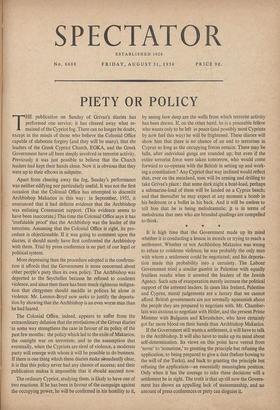PIETY OR POLICY
THE publication on Sunday of Grivas's diaries has performed one service; it has cleared away what re- mained of the Cypriot fog. There can no longer be doubt, except in the minds of those who believe the Colonial Office capable of elaborate forgery (and they will be many), that the leaders of the Greek Cypriot Church, EOKA, and the Greek Government have all been deeply involved in terrorist activity. Previously it was just possible to believe that the Church leaders had kept their hands clean. Now it is obvious that they were up to their elbows in saltpetre.
Apart from clearing away the fog, Sunday's performance was neither edifying nor particularly useful. It was not the first occasion that the Colonial Office has attempted to discredit Archbishop Makarios in this way : in September, 1955, it announced that it had definite evidence that the Archbishop was enlisting Communist support. (This evidence seems to have been inaccurate.) This time the Colonial Office says it has 'irrefutable proof' that the Archbishop was the leader of the terrorists. Assuming that the Colonial Office is right, its pro- cedure is objectionable. If it was going to comment upon the diaries, it should surely have first confronted the Archbishop with them. Trial by press conference is no part of our legal or political system.
More depressing than the procedure adopted is the confirma- tion it affords that the Government is more concerned about other people's piety than its own policy. The Archbishop was deported to the Seychelles because he refused to condemn violence, and since then there has been much righteous indigna- tion that clergymen should meddle in politics let alone in violence. Mr. Lennox-Boyd now seeks to justify the deporta- tion by showing that the Archbishop is an even worse man than he had feared.
The Colonial Office, indeed, appears to suffer from the extraordinary delusion that the revelations of the Grivas diaries ' in some way strengthens the case in favour of its policy of the past few months : the policy which led to the exile of Makarios; the outright war on terrorism; and to the assumption that eventually, when the Cypriots are tired of violence, a moderate party will emerge with whom it will be possible to do business. If there is one thing which these diaries make abundantly clear, it is that this policy never had any chance of success; and their publication makes it impossible that it should succeed now.
The ordinary Cypriot, studying them, is likely to have one of two reactions. If he has been in favour of the campaign against the occupying power, he will be confirmed in his hostility to it, by seeing how deep are the wells from which terrorist activity has been drawn. If, on the other hand, he is a peaceable fellow who wants only to be left in peace (and possibly most Cypriots by now feel this way) he will be frightened. These diaries will show him that there is no chance of an end to terrorism in Cyprus so long as the occupying forces remain. There may be lulls, after individual gangs are rounded up; but even if the entire terrorist force were taken tomorrow, who would come forward to co-operate with the British in setting up and work- ing a constitution? Any Cypriot that way inclined would reflect that, over on the mainland, men will be arming and drilling to take Grivas's place : that some dark night a boat-load, perhaps a submarine-load of them will be landed on a Cyprus beach; and that thereafter he may expect at any moment a bomb in his bedroom or a bullet in his back. And it will be useless to tell him that he is being melodramatic; it is in terms of melodrama that men who are branded quislings are compelled to think.
It is high time that the Government made up its mind whether it is conducting a lesson in morals or trying to reach a settlement. Whether or not Archbishop Makarios was wrong to refuse to condemn violence, he was probably the only man with whom a settlement could be negotiated; and his deporta- tion made this probability into a certainty. The Labour Government tried a similar gambit in Palestine with equally fruitless results when it arrested the leaders of the Jewish Agency. Such acts of exasperation merely increase the political support of the arrested leaders. In cases like Ireland, Palestine and Cyprus, moral judgements are a luxury that we cannot afford. British governments are not normally squeamish about the people they are prepared to negotiate with. Mr. Chamber- lain was anxious to negotiate with Hitler, and the present Prime Minister with Bulganin and Khrushchev, who have certainly got far more blood on their hands than Archbishop Makarios.
If the Government still wants a settlement, it will have to talk to the Archbishop. It will also have to make up its mind about self-determination. Its views on this point have veered from `never' to 'sometime,' to granting the principle but refusing the application, to being prepared to give a date (before bowing to the will of the Turks), and back to granting the principle but refusing the application—an essentially meaningless position. Only when it has the courage to take these decisions will a settlement be in sight. The truth is that up till now the Govern- ment has shown an appalling lack of statesmanship, and no amount of press conferences or piety can disguise it.


































 Previous page
Previous page